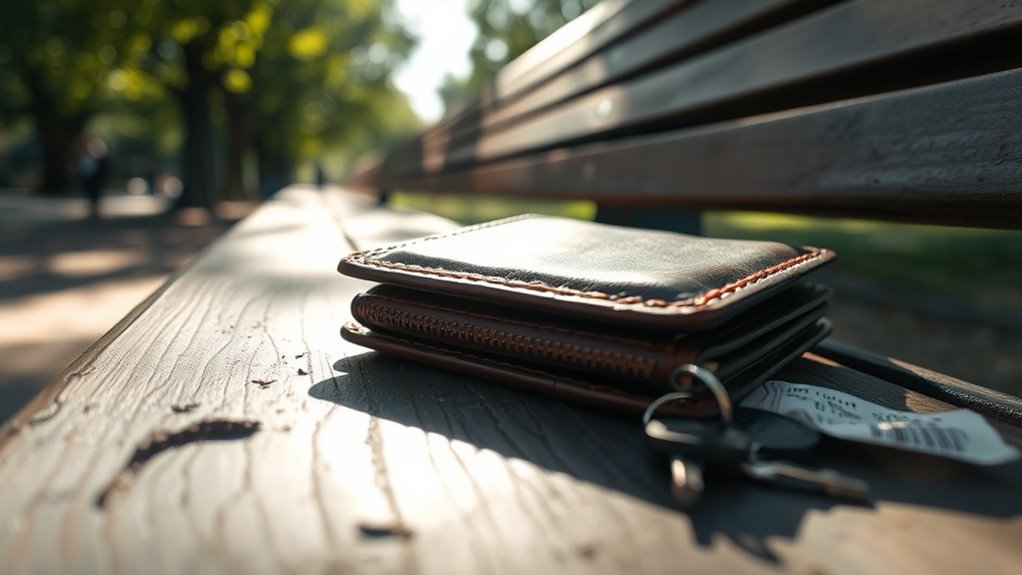To get your stuff back, retrace your steps and visit the places you’ve last seen or used your belongings. Check lost and found departments and share detailed descriptions along with your contact info. Use technology like “Find My” services or tracking devices to locate your items. Post on social media community groups and report your loss to authorities for valuable items. Keep following up and stay persistent—more tips below can really boost your chances.
Key Takeaways
- Retrace your steps and visit relevant locations or lost and found departments promptly.
- Use tracking technology like “Find My” apps or RFID tags to locate your items.
- Post detailed descriptions on social media and community groups to broaden awareness.
- Report the loss to authorities and file police reports for valuable or identifiable items.
- Stay persistent, follow up regularly, and leverage online listings to increase recovery chances.

Have you ever lost something valuable and wondered if you’ll ever get it back? It’s a frustrating feeling that can leave you feeling helpless and anxious. Whether it’s your wallet, phone, or a favorite piece of jewelry, the initial shock might make you feel like it’s gone forever. But before you resign yourself to the loss, there are concrete steps you can take to increase your chances of recovery. The key is to act swiftly and stay organized in your approach.
Start by retracing your steps. Think about where you last had the item and visit those locations if possible. Sometimes, simply returning to the scene can jog someone’s memory or lead you to your lost possession. If you’re in a public place like a park, mall, or restaurant, check with the lost and found department. Many places keep a log of lost items, and reporting what you’ve lost immediately increases the likelihood of someone turning it in. Be specific when describing your item — include details like color, brand, and any distinguishing features. Providing your contact info helps if someone finds it later.
Next, leverage technology to help locate your belongings. If you’ve lost your phone, use features like “Find My iPhone” or “Find My Device” for Android. These tools can pinpoint your device’s location, make it ring, or even lock and erase it remotely to protect your data. For laptops or tablets, similar tracking options exist. If your item is a wallet or bag with RFID tags or tracking devices, activate those to locate it. If you don’t have tech-based tracking, consider calling your service provider to suspend accounts or block your cards to prevent misuse.
Don’t underestimate the power of social media. Post a clear, detailed description of the lost item on local community groups or neighborhood pages. Sometimes, honest people who find your belongings look online first. Include contact info and ask for sharing to reach more eyes quickly. Additionally, contact local authorities or police stations. Filing a report can be useful, especially if your item contains valuable or identifiable property. Police reports can also help with insurance claims later.
Furthermore, familiarize yourself with Frictional Unemployment, as understanding economic concepts can help you stay resilient and open to new opportunities if you experience setbacks. Staying persistent is crucial. Follow up regularly with lost and found departments, check online classified ads, and keep an eye out for any notifications. Remember, many lost items are returned weeks or even months later. Patience and consistent effort are your best tools. While losing something valuable feels discouraging, taking proactive steps can considerably improve your chances of getting your stuff back. The process might require some time and effort, but don’t give up — your belongings could be just around the corner waiting to be reunited with you.
Frequently Asked Questions
How Long Does It Typically Take to Recover Lost Items?
It usually takes anywhere from a few days to a few weeks to recover lost items, depending on where you lost them and how quickly you report the loss. If you contact the lost and found department promptly and provide detailed information, they can often locate your belongings faster. Keep in mind, some items may take longer if they require extra investigation or if they’re in a busy area.
What Should I Do if My Lost Item Isn’t Found?
When your lost item isn’t found, don’t give up hope; treat it like a puzzle waiting to be solved. You should revisit the places you last saw it, check with lost and found offices, and post on social media or community boards. Contact your local authorities or transit agencies, and consider filing a report. Persistence is key—sometimes, the most unexpected places hold the answers you seek.
Are There Any Costs Associated With Retrieving Lost Property?
Costs for retrieving lost property vary depending on the location and circumstances. Some places may charge a fee for handling or storage, while others offer free retrieval. If you’re dealing with a private company or a specialized service, expect to pay for their efforts. Always ask about potential charges upfront to avoid surprises. In many cases, local authorities or lost and found offices don’t charge for returning your belongings.
How Can I Prevent Losing Items in the Future?
To prevent losing items in the future, you should develop habits like always placing your belongings in the same spot and double-checking before leaving any place. Use organizers, labels, or keychains to keep track of your essentials. Avoid distractions when handling important items, and consider using technology like tracking devices or apps. Staying mindful and organized helps reduce the chances of losing your stuff and makes recovery easier if it happens.
What Legal Steps Can I Take if My Belongings Are Stolen?
If your belongings are stolen, you should immediately report the theft to the police, providing detailed descriptions and any evidence. File a police report to create an official record. You can also contact your insurance company if your items are insured. Keep copies of all reports and evidence. Consider consulting a lawyer to understand your legal options for pursuing recovery or compensation, especially if you suspect a specific individual.
Conclusion
Think of your misplaced belongings as treasures lost at sea. With patience, effort, and a bit of luck, you can become the brave sailor who navigates the storm and reclaims their ship. Every item found is like a shining island on the horizon, promising relief and discovery. So keep your compass steady, stay persistent, and remember: even the deepest waters hide your treasures waiting to be found. Your belongings are just a voyage away.










